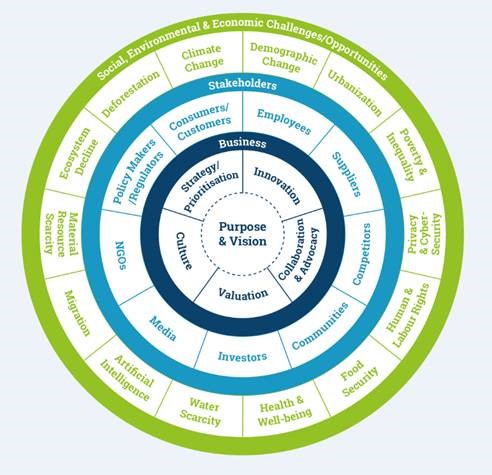MSc Management Global Strategy and Sustainability Assignment Sample Introduction
Tesla is a successful and highly reputed auto mobile company, operating across the international level (Qin et. al. 2021).http://MSc Management Global Strategy and Sustainability Assignment Sample The company is engaged in designing, developing, manufacturing, as well as selling electric vehicles, solar panels, engines, and hybrid automated systems.
Moreover, the report emphasises on analysing the internal and external factors affecting Tesla and its operations. Not only this, it also observes the strategies or techniques implemented by Tesla for conducting it internationalisation processes and activities.
Conclusively, the report includes the application of CSR pyramid model to highlight the CSR initiatives of Tesla, while also proposing recommendations to address the identified ethical issues.
Task 1- The External and Internal Environment
External Environment Analysis
PESTLE Analysis
Political Factors: Different countries and their government offers favourable opportunities for Tesla, including tax credit, redemption, and incentives.
It supports its hybrid automated systems, electric vehicles, and hybrid engines. Although, the political tensions between the United States and China have highlighted negative impacts upon the business operations of Tesla, yet, the company somehow managed to penetrate into the Chinese market.
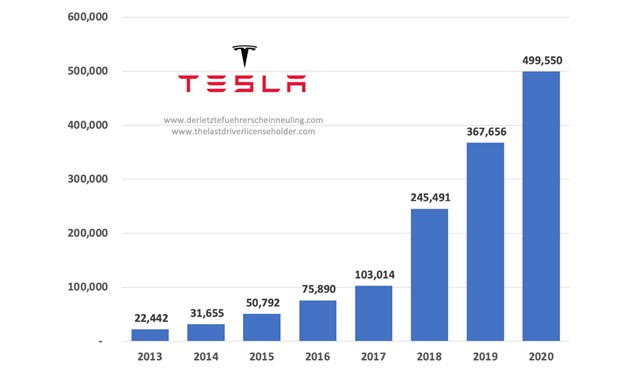
Figure 1 Tesla Sales Numbers from 2013 to 2020
(Source: Mario Herger, 2021)
Economic Factors: The automobile corporation highlighted its annual revenue, amounting to approximately 28.176 billion USD in 2019 (Zhou, 2022). http://MSc Management Global Strategy and Sustainability Assignment SampleIt highlight and increment by around 15.40%, nonetheless, highlighting a decline in internet income by 163.48%. Also, the total revenue earned by Tesla in 2021 amounted to $53.82 billion, highlighting a growth rate of about 71% as compare to the figures in 2020, amounting to $31.53 billion.
However, the overpriced, premium, and luxury electric vehicles manufactured by Tesla or a major economic concern for the prospective consumers in the developing countries.
Social Factors: The societal factors highlight favourable trends and opportunities for Tesla, concerning its green or eco-friendly business practises. It includes the production of electric vehicles, hybrid engines, automated systems, and solar panels.
These aspects tend to capture the interest and attention of relevant stakeholder groups. Moreover, the company has also initiated product diversification plans, revolving around production of SUV cars and other economic car models for capturing the lower-and-middle-income customers.
Technological Factors: Consistent technological innovation and upgradation has been the core strength for Tesla since its inception (Wang and Peng, 2020).http://MSc Management Global Strategy and Sustainability Assignment Sample
Moreover, its automated systems, hybrid engines, and battery technologies have offered several advantages. However, recently the customers of Tesla have registered several complaints and negative feedbacks concerning its battery technology, due to its ineffectiveness, improper use and application.
Also, individuals face complexities in appropriately using these modernised technologies, because of lack of understanding and awareness.
Legal Factors: Tesla strictly compliance to the policies, regulations, laws, and rules formulated in different countries in which it operates. Additionally, the company frequently assesses any type of change or upgradation in the policies and laws, thereby, eliminating any potential legal issues.
However, Tesla faced certain legal challenges concerning the autopilot mode in it electric cars, which caused certain accidents. It resulted in the customers filing lawsuit against the company and its defective product (Rastvortseva and Shchitova, 2020).http://MSc Management Global Strategy and Sustainability Assignment Sample Yet, Tesla is now focusing on mitigation of such issues and challenges by testing and evaluating its battery technology and autopilot mode.
Environmental Factors: Production of electric vehicles, hybrid automated engines, and solar panels reflect the contribution of Tesla towards environmental sustainability and protection. Moreover, its objectives of becoming zero-carbon emission, reduced footprint, and fuel efficiency and to highlight its robust brand image and reputation as a green business.
Furthermore, the charging stations set up by the company in different countries tend to set high standards for other auto mobile companies in the industry, thereby, promoting sustainability, environmental protection, and green business practises (Bredenfeld et. al. 2020). http://MSc Management Global Strategy and Sustainability Assignment SampleHence, the PESTLE analysis highlights favourable trends and opportunities for Tesla in different nations.
Internal Environment Analysis
Value Chain Analysis
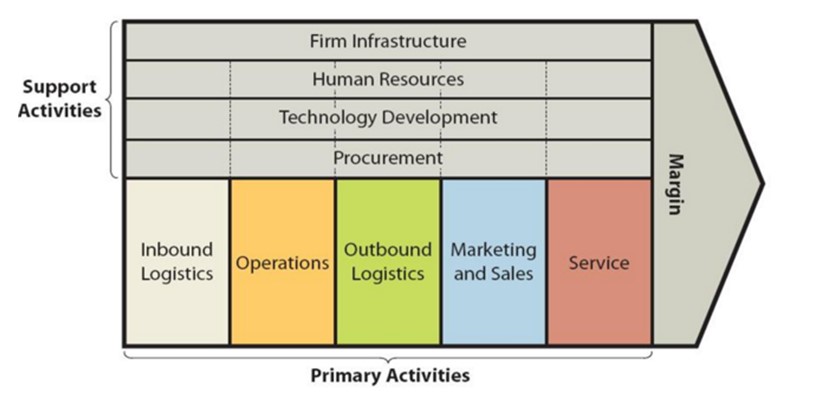
Figure 2 Value Chain Analysis of Tesla
(Source: John Dudovskiy, 2021)
Inbound Logistics: Tesla effectively manages its inbound logistics operations, which include Receiving and warehousing the raw materials, the solar panels, and the hybrid engines or storage systems. Additionally, the corporation principally undertakes its production activities at its automatic plant, based in Fremont, California, as well as its giga factory in Nevada.
Although, the emote logistics operations of the company do not contribute in creating business values for Tesla, yet, the company is emphasising on accomplishing economies of scale, operational efficiency, and overall business effectiveness.
Operations: The operations of Tesla are categorised into two major operational segments, which are, Automotive as well as energy generation or storage (Sotnyk et. al. 2020). http://MSc Management Global Strategy and Sustainability Assignment Sample
The primary operational category includes the development, manufacturing, sales, and distribution of electric vehicles manufactured by Tesla, whereas, the second operational segment involves designing, developing, and selling the energy storage products, the hybrid engines, and electricity generated by the solar energy systems of the company.
In combination with these, the modern technologies of robotics, cloud computing, and artificial intelligence create excellent values for Tesla.
Outbound Logistics: The outbound logistic operations of Tesla comprise of the warehousing facilities, storage, as well as distribution of the energy storage systems, electric cars, and solar panels.
Furthermore, the business strategy of the company tends to eliminate any intermediaries or the sellers, in order to prevent additional cost or expenses to the consumers. This technique has been a consistent source of value creation for Tesla, since its inception.
Marketing and Sales activities: The marketing and sales operations of the company reflect certain similarities with its rival auto mobile corporations across the international platform (Cozzi and Petropoulos, 2019).http://MSc Management Global Strategy and Sustainability Assignment Sample Although, the Zero-Dollar marketing strategy adopted by Tesla is a major point of differentiation, concerning the marketing plans of Tesla, as it has enabled Tesla to gain popularity and extensive media coverage.
These practises have been a key source of creating values for the company, while also supporting word of mouth marketing for the electric vehicles and other sustainable product offerings of Tesla.
Services: Considering the services practises or dimension, Tesla has encountered certain issues, concerning the negative feedbacks and complaints listed by high-profile customers, related to servicing of the Tesla cars. The ignorance and negligence of the company staff towards the customers has resulted in such problems.
Nonetheless, the company has altered its strategy, which now enables the customers to directly approach the company executive about their issues and problems concerning the cars manufactured by the company (Gomez Vilchez et. al. 2019).http://MSc Management Global Strategy and Sustainability Assignment Sample It has now resulted in providing the best solutions to the consumers for immediately addressing their problems. Hence, it is a principal source for developing values for the company.
Three Critical Factors
The three crucial factors for the joint auto mobile company, include expensive auto mobile products, aggressive rivalry in the industry, and damaged brand-name because of improper and ineffective services to the customers. Nonetheless, Tesla is A globally successful auto mobile company, maintaining its competitive edges, through the modernise technologies, innovation, sustainable practises, and other sources of competitiveness.
Yet, the company must focus on implementation and integration of effective strategic plans for strengthening its position in the industry, for retaining its competitiveness, and ensure sustained growth over the long run (Agrawal and Rajapatel, 2020). http://MSc Management Global Strategy and Sustainability Assignment Sample
Additionally, consistently improving its strategic plans and tactics, while also emphasising on post sales services to the consumers have supported Tesla to engage any potential issues concerning customer dissatisfaction or lack of retention.
Although, Tesla is now emphasising on catering to the demands and preferences of the lower-and middle-income group customers by launching SUV cars and other economic car models, with reduced prices, cost effectiveness, accomplishment of economies of scale, and overall efficiency with a net supply chain network. Such strategic plans and techniques are observed to enable Tesla to mitigate its weaknesses, and potential risk factors, thereby, ensuring it sustained growth, development, and success in the auto mobile industry across the international level.
Sources of Competitiveness
The automobile company is globally known for its competitiveness and strong position in the industry (Danielis et. al. 2020).http://MSc Management Global Strategy and Sustainability Assignment Sample The key sources include its innovative battery technology, robust supply chain network, and its production system for electric cars, solar panels, and hybrid engines.
Moreover, the batteries developed by Tesla or not only integrated in its electrical vehicles, but also in households at large grade applications. The quality standards of the battery are maintained by Tesla’s partner form, Panasonic. Additionally, the branding strategies and techniques, autonomous driving capacities, as well as supercharger network system implemented by Tesla are the key foundations for its sustained competitiveness in the industry.
Not only this, Tesla’s proprietary super-fast stations for charging its EVs highlight significant growth-oriented opportunities in the modern corporate world. Other than this, strong, highly visible, and robust brand name and reputation of the firm reflects its major competitive advantages or success factors, across the global level.
Task 2- Strategy in the Global Environment
Motives for Tesla to expand internationally
The principle motivating factors or purposes revolving around the globalisation of Tesla include its sustainable or green business practises (Kalasin et. al. 2020).http://MSc Management Global Strategy and Sustainability Assignment Sample
Moreover, production and distribution of electric vehicles, hybrid engines, and automated systems offered significant opportunities to the company for its expansion in a number of nations.
Furthermore, it also alliance with the corporate objectives of the company, which include an increment in its revenue or income streams. Currently, the company has established and maintains about 438 authorised stores in different nations, and 100 service centres, highlighting its global success and visibility.
Other than this, the fast-growing demand among the population, concerning electric vehicles, solar panels, as well as hybrid automated systems showcases growth-oriented opportunities.
Not only this, Tesla taps transnational demand for its key product, electric cars (Fernández-Méndez et. al. 2018).http://MSc Management Global Strategy and Sustainability Assignment Sample Additionally, consistent innovation, technological upgradation, modern design, automated vehicles, and high-performance tend to combine for strengthening Tesla in the global market.
Modes of International Expansion
The international entry mode selected by Tesla to expand across the international platform, revolves around direct selling approach. The principal reason behind this is the purpose or objective of the company to eliminate any additional cost or expenditure associated with intermediaries or retailers within the developed supply chain network.
The authorised stores and service centres of the company stands in stark as compare to the traditional entry mode of franchisee dealership. In addition to this, Tesla guarantees excellent service coverage, which emphasises on properly informing its consumers about the newly launched cars, their benefits, and features (Bortoluzzi et. al. 2018).http://MSc Management Global Strategy and Sustainability Assignment Sample
It also helps the company to eliminate any conflict of interest areas, concerning the differences in gasoline powered and electric vehicles. Hence, the direct selling approach of international expansion is the best suitable one for Tesla, concerning its overall objectives, business structure, pricing strategy, as well as goals of excellent customer services and satisfaction.
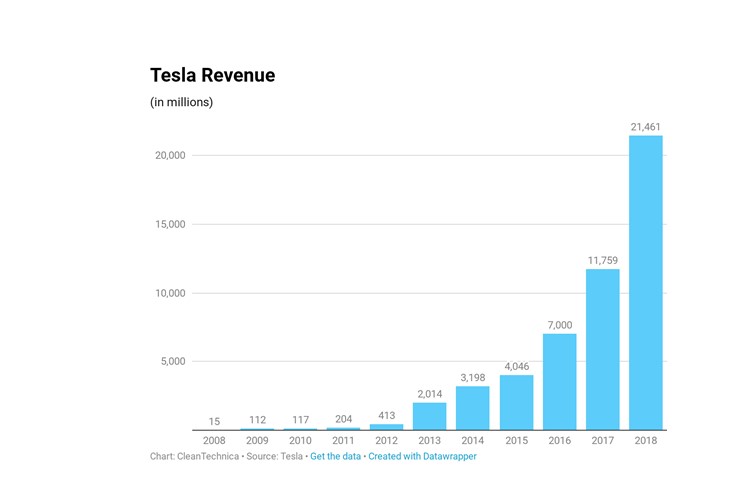
Figure 3 Tesla’s Incredible Growth, Past & Future — How The Company Could Continue Hyper Growth
(Source: Paul Fosse, 2019)
Recommendation for the best International entry mode
Yet, the company must principally emphasise on guaranteeing appropriate adaptability to words the local needs and demands of its target customers in the countries it operates in. It is primarily associated with the adaptation of its product offerings and customer services depending upon their local preferences, country characteristics, and societal aspects.
For an instance, the target customers of Tesla in the Indian market prefer gasoline powered cars and vehicles which run on fuel. It might be a significant challenge for Tesla to penetrate into the Indian market (Zona et. al. 2022). http://MSc Management Global Strategy and Sustainability Assignment SampleTherefore, successful adaptation and localisation concept will help Tesla to eliminate such issues and challenges.
The company must strengthen its competencies and abilities to mitigate such potential issues and problems concerning fast changing customer demands, complexity, and dynamic attributes of corporate culture in different nations.
Strategies for competing in global markets
Tesla has successfully adopted and implemented a proper strategy for competing in global markets, which is the Transnational approach or technique. This is because, Tesla emphasises on successful establishment of its authorised outlets and service centres across the global level.
Not only this, the implemented transnational strategy has enabled Tesla to maximise its visibility, wide reaching marketing effort, and its influencing brand name, which has eventually offered several advantages since several years (Ang et. al. 2018).http://MSc Management Global Strategy and Sustainability Assignment Sample
Not only this, these strategies have combined to act as a basis to boost the sales of the company and adapt it product offerings depending upon the local preferences and market conditions in different countries.
Additionally, the production or manufacturing system integrated by Tesla in Fremont, California is a significant factor for its competitiveness and internationalisation. This is because, it facilitates economies of scale, operational efficiency, vertical integration strategy, and cost effectiveness.
The transnational strategy or approach has been A core success factor to develop and establish on factories of Tesla in a number of markets, thereby, ensuring its strong visibility in China and European nations (Singh et. al. 2019). http://MSc Management Global Strategy and Sustainability Assignment SampleHence, the transnational approach of a significant advantages to Tesla, thereby, supporting it to be a global player in the auto mobile industry.
Recommendation for the best international strategy for Tesla
The implemented transnational strategy is highly suitable and appropriate for Tesla, concerning its internationalisation objectives and business model. Yet, Tesla must emphasise on strengthening its capabilities and competencies, being a producer of electric cars and hybrid automated systems over the international platform. Moreover, the transnational approach would offer additional advantages if expanded to other attractive market or different nations.
It will immensely support Tesla to diversify its product offerings, hence, ensuring its availability, accessibility, and applicability to wider customer segments (Cuervo‐Cazurra et. al. 2019). http://MSc Management Global Strategy and Sustainability Assignment SampleHence, such strategies hold the potential to maximise operational efficiency levels, cost effectiveness, as well as economies of scale, thereby, serving to the demands of lower- and middle-income customers.
Task 3- Corporate Strategy
Vertical Integration Strategy
Vertical and horizontal strategies of integration are associated with business expansion strategies or approaches of an organisation. Tesla has adopted and implemented the vertical strategy of integration, which has been a core strength of the company since its inception.
The principal rationale behind this is that Tesla is 80% vertically integrated, in contrast to other auto mobile companies (Peng, 2021). http://MSc Management Global Strategy and Sustainability Assignment SampleThe rival brands of Tesla Are observed to outsource a significant proportion of the business operations, ranging from acquisition of basic materials to a number of supplier companies.
In comparison to this, a significant proportion of manufacturing activities of Tesla or performed in its Fremont factory, based in California. It implies that the company gains a number of advantages, like cost reduction, innovation, and overall effectiveness.
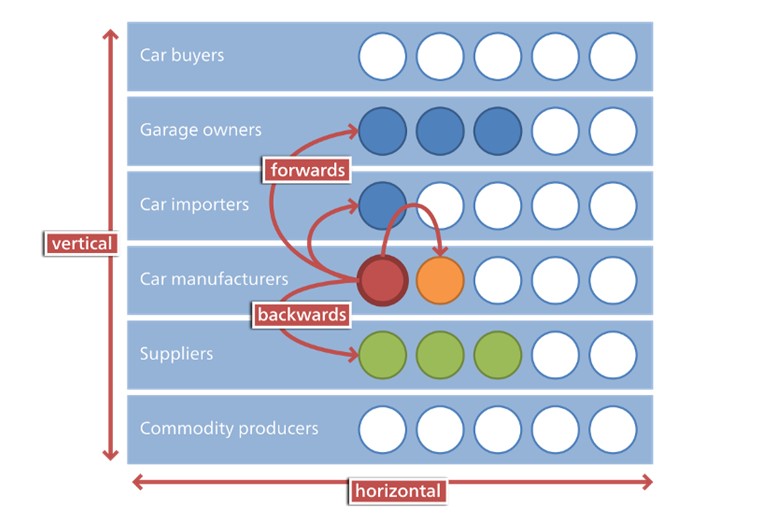
Figure 4 Vertical and Horizontal Integration
(Source: Behzad Benam, 2020)
Tesla is strongly driven with it goals of accomplishing vertical integration strategy in its business model, which facilitates its globalisation or internationalisation procedures.
Moreover, the strategy has facilitated the company to ensure proper control over its business activities, quality standards of electric vehicles, and entire supply chain network.
It is also a key foundation behind the integration of a complex supply chain across the auto mobile industry (Barbé and Morillas, 2019). http://MSc Management Global Strategy and Sustainability Assignment SampleHence, the vertical integration strategy has pushed technological upgradation and innovation in Tesla, thereby, ensuring streamlining and optimising the delivery time taken by the company to deliver the electric vehicles, solar panels, and hybrid automated systems to the consumers.
In addition to this, recently, the CEO of Tesla, Elon Musk, also stated that the development and manufacturing processes and Tesla are principally aligned towards global success.
Also, the company had no any other strategy, other than vertical integration, as the company principally relies on technology and innovative tools. Therefore, the approach of strategy of vertical integration ensures the best product quality standards and overall efficiency in the workplace.
Recommendations
Nonetheless, Tesla must focus on successful establishment and management of long-term associations with its different suppliers or vendors. The principal reason behind this is that Tesla undertakes its operations and product development procedures, depending upon Make-to-Order Approach.
It implies that Tesla is highly dependent and reliable upon its suppliers (Grant and Phene, 2022). http://MSc Management Global Strategy and Sustainability Assignment SampleOther than this, optimisation of the supply chain network by recognising the principal criteria, likes speedy processes, agile manufacturing, and digital collaboration are also significant techniques for Tesla.
Task 4- Strategic Purpose-Ethics and CSR
Carroll’s CSR Pyramid Model
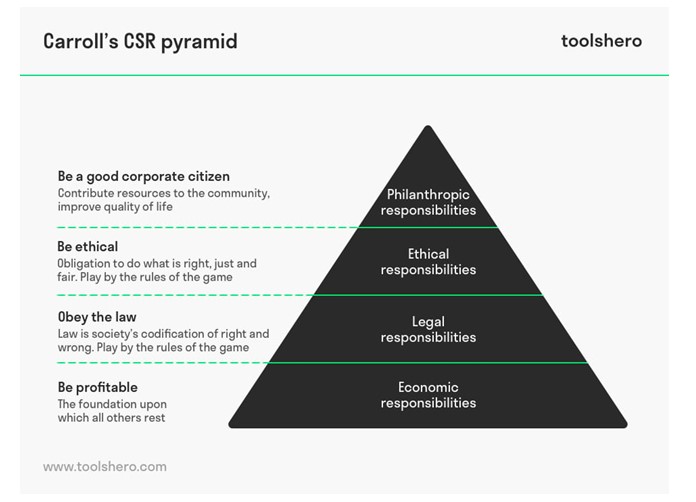 Figure 5 Carroll’s CSR Pyramid
Figure 5 Carroll’s CSR Pyramid
(Source: Carroll’s CSR pyramid, 2020)
| Carroll’s CSR Pyramid Model | |
| Economic Responsibilities: | Recently, Tesla highlighted its net income of around $5.5 billion in the year 2021, as compare to its earnings of $721 million in the previous year. Also, it reflects a significant increment in the number of electric cars successfully delivered to the customers, with a rate of 87%, which implies the delivery of around 9,36,000 cars. |
| Legal Responsibilities: | Tesla focuses on complying and adhering to all the formulated rules, regulations, laws, and policies in different countries in which it undertakes its business operations or activities. Moreover, the company has also improved its services and business processes to further maximise its contribution towards environment and society (Benzian et. al. 2021). However, the company recently faced certain issues concerning the violation of regulations and policies associated with labour protection, as its managers threatened the labourers while forming trade unions. |
| Ethical Responsibilities: | Tesla is strongly driven with its ethical objectives and goals of ensuring that all its business practises are safe and ethical. Moreover, it values and respect each of its employees, while ensuring their treatment with equality and dignity. The company also guarantees the integration of concepts like environmental protection, sustainability, and green business operations within its business procedures and supply chain network (Latapí Agudelo et. al. 2019). Also, it has highlighted its long-term objectives of becoming net zero carbon emission and reduced environmental footprint. |
| Philanthropic Responsibilities: | Tesla is committed to retain the interest of its relevant stakeholder groups, including the communities and societies. Moreover, the corporate citizenship strategy of the company tends to maximum satisfy the needs and expectations of the stakeholders and communities, while also retaining their interest. For this purpose, Tesla has offered a set of unique advantages to its stakeholders, concerning digital tools for their interaction, as well as modernised technologies. |
Identified ethical issues
An assessment and analysis highlight that Tesla has faced a principle issue of business ethics, which is the violation of formulated environmental policies and regulations, employee protection, as well as alleged fraud.
The company has also made misleading statements highlighting it strong relationship or integration of improper techniques to produce the model three cars (Zaman et. al. 2022).http://MSc Management Global Strategy and Sustainability Assignment Sample
Furthermore, the workers and labourers of Tesla have complained for unhealthy and negative working situations, lack of career advancement opportunities, and workplace discrimination. In addition to this, certain managers and leaders of Tesla have threatened the labourers, while they formed trade unions against Tesla.
The company also recorded a number of incidents related to child labour, poor workplace environment, and workplace discrimination and sexual harassment.
Recommendations for addressing the identified ethical issues
Therefore, Tesla is recommended to emphasise on appropriate implementation and incorporation of transformational leadership style. This is because, the ethical problems within the company, like sexual harassment, lack of employee motivation and satisfaction, arrogant managers and executives, and only workplace conditions can be resolved by such a strong transformational leader (Sharma, 2019).http://MSc Management Global Strategy and Sustainability Assignment Sample
In addition to this, the company must assign responsibility and accountability to one of its managers and executives for addressing the issues concerning employee safety and protection.
Moreover, it must consider proper resolution of issues associated with violation of environmental laws and safety policies. Tesla should also comply with the formulated or established policies, standards, and laws related to sustainability, green business practises, and corporate social responsibilities in each country, it undertakes its business practises in.
Conclusion
Hence, the above study articulate that Tesla performs its business activities in a fast changing, dynamic, and highly competitive corporate world. The above study displayed an analysis of the internal as well as external environment of the auto mobile company, by applying suitable models or theoretical frameworks.
It also observed the internationalisation strategy of Tesla, while also shedding light on its CSR initiatives and responsibilities. Furthermore, comprehensive Hazard identification, safety incentives, and employee motivation must be prioritised in the Tesla workplace. Hence, these strategies will ensure proper resolution of the issues faced by Tesla, concerning business ethics and CSR.
References
Abbas, J., (2020). Impact of total quality management on corporate green performance through the mediating role of corporate social responsibility. Journal of Cleaner Production, 242, p.118458.
Agrawal, M. and Rajapatel, M.S., (2020). Global perspective on electric vehicle (2020). International Journal of Engineering Research & Technology, 9(1), pp.8-11.
Ali, H.Y., Danish, R.Q. and Asrar‐ul‐Haq, M., (2020). How corporate social responsibility boosts firm financial performance: The mediating role of corporate image and customer satisfaction. Corporate Social Responsibility and Environmental Management, 27(1), pp.166-177.
Ang, S.H., Benischke, M.H. and Hooi, A.W.L., (2018). Frequency of international expansion through high control market expansion modes and interlocked directorships. Journal of World Business, 53(4), pp.493-503.
Barbé, E. and Morillas, P., (2019). The EU global strategy: the dynamics of a more politicized and politically integrated foreign policy. Cambridge review of international affairs, 32(6), pp.753-770.
Benzian, H., Guarnizo-Herreño, C.C., Kearns, C., Muriithi, M.W. and Watt, R.G., (2021). The WHO global strategy for oral health: an opportunity for bold action. The Lancet, 398(10296), pp.192-194.
Bortoluzzi, G., Kadic-Maglajlic, S., Arslanagic-Kalajdzic, M. and Balboni, B., (2018). Innovativeness as a driver of the international expansion of developing markets’ firms: Evidence of curvilinear effects. International Marketing Review.
Bredenfeld, L., Cherubim, M., Kellermann, A.C., Lehmann, C., Malberg, S., Rafn, J., Kwon, Y. and Choi, S., (2020). Tesla Moving Forward. 신산업경영저널, 38(1), pp.47-70.
Cozzi, L. and Petropoulos, A., (2019). Growing preference for SUVs challenges emissions reductions in passenger car market.
Cuervo‐Cazurra, A., Mudambi, R. and Pedersen, T., (2019). Clarifying the relationships between institutions and global strategy. Global Strategy Journal, 9(2), pp.151-175.
Danielis, R., Rotaris, L., Giansoldati, M. and Scorrano, M., (2020). Drivers’ preferences for electric cars in Italy. Evidence from a country with limited but growing electric car uptake. Transportation Research Part A: Policy and Practice, 137, pp.79-94.
Fernández-Méndez, L., García-Canal, E. and Guillén, M.F., (2018). Domestic political connections and international expansion: It’s not only ‘who you know’that matters. Journal of World Business, 53(5), pp.695-711.
Gelmanova, Z.S., Zhabalova, G.G., Sivyakova, G.A., Lelikova, O.N., Onishchenko, O.N., Smailova, A.A. and Kamarova, S.N., (2018), May. Electric cars. Advantages and disadvantages. In Journal of Physics: Conference Series (Vol. 1015, No. 5, p. 052029). IOP Publishing.
Gomez Vilchez, J.J., Smyth, A., Kelleher, L., Lu, H., Rohr, C., Harrison, G. and Thiel, C., (2019). Electric car purchase price as a factor determining consumers’ choice and their views on incentives in Europe. Sustainability, 11(22), p.6357.
Grant, R. and Phene, A., (2022). The knowledge based view and global strategy: Past impact and future potential. Global Strategy Journal, 12(1), pp.3-30.
Islam, T., Islam, R., Pitafi, A.H., Xiaobei, L., Rehmani, M., Irfan, M. and Mubarak, M.S., (2021). The impact of corporate social responsibility on customer loyalty: The mediating role of corporate reputation, customer satisfaction, and trust. Sustainable Production and Consumption, 25, pp.123-135.
Kalasin, K., Cuervo‐Cazurra, A. and Ramamurti, R., (2020). State ownership and international expansion: The S‐curve relationship. Global Strategy Journal, 10(2), pp.386-418.
Latapí Agudelo, M.A., Jóhannsdóttir, L. and Davídsdóttir, B., (2019). A literature review of the history and evolution of corporate social responsibility. International Journal of Corporate Social Responsibility, 4(1), pp.1-23.
Peng, M.W., (2021). Global strategy. Cengage learning.
Qin, Y., Xiao, Y. and Yuan, J., (2021), September. The Comprehensive Competitiveness of Tesla Based on Financial Analysis: A Case Study. In (2021) International Conference on Financial Management and Economic Transition (FMET (2021)) (pp. 462-469). Atlantis Press.
Rastvortseva, S. and Shchitova, S., (2020). FEATURES OF SHAPING THE COMPANY’S COMPETITIVENESS IN THE GLOBAL AUTOMOTIVE MARKET. Journal of Regional and International Competitiveness, (1), pp.71-82.
Sharma, E., (2019). A review of corporate social responsibility in developed and developing nations. Corporate Social Responsibility and Environmental Management, 26(4), pp.712-720.
Singh, D., Agusti, A., Anzueto, A., Barnes, P.J., Bourbeau, J., Celli, B.R., Criner, G.J., Frith, P., Halpin, D.M., Han, M. and Varela, M.V.L., (2019). Global strategy for the diagnosis, management, and prevention of chronic obstructive lung disease: the GOLD science committee report (2019). European Respiratory Journal, 53(5).
Sotnyk, I., Hulak, D., Yakushev, O., Yakusheva, O., Prokopenko, O.V. and Yevdokymov, A., (2020). Development of the US electric car market: Macroeconomic determinants and forecasts. Polityka Energetyczna, 23.
Tamvada, M., (2020). Corporate social responsibility and accountability: a new theoretical foundation for regulating CSR. International Journal of Corporate Social Responsibility, 5(1), pp.1-14.
Wang, J. and Peng, X., (2020). a study of patent open source strategies based on open innovation: The case of tesla. Open Journal of Social Sciences, 8(07), p.386.
Ye, N., Kueh, T.B., Hou, L., Liu, Y. and Yu, H., (2020). A bibliometric analysis of corporate social responsibility in sustainable development. Journal of cleaner production, 272, p.122679.
Zaman, R., Jain, T., Samara, G. and Jamali, D., (2022). Corporate governance meets corporate social responsibility: Mapping the interface. Business & Society, 61(3), pp.690-752.
Zhou, Y., (2022), April. Research on Influencing Factors of Tesla Pricing Strategy. In (2022) 7th International Conference on Social Sciences and Economic Development (ICSSED (2022)) (pp. 107-114). Atlantis Press.
Zona, F., Bannò, M. and Coller, G., (2022). International Expansion and Firm Growth in Domestic Markets: Family Versus Non-Family Firms. Family Business Review, p.08944865221084423.
Online:
Arjun Joshi, 2022. Tesla’s Net Income Up 665% YoY With $5.52 Billion in 2021. [Online:]. Accessed through:< https://mercomindia.com/tesla-net-income-2021/ >
Behzad Benam, 2020. Why Vertical Integration Made Tesla More Powerful. [Online:]. Accessed through:< https://medium.com/@bhbenam/why-vertical-integration-made-tesla-more-powerful-8b33b6aee773 >
Carroll’s CSR pyramid, 2020. [Online:]. Accessed through:< https://www.toolshero.com/strategy/carroll-csr-pyramid/ >
Eva Fox, 2020. [Online:]. Accessed through:< https://www.tesmanian.com/blogs/tesmanian-blog/tesla-exponential-growth-rate-from-100-weekly-production-in-q3-2012-to-11k-weekly-units-in-q3-2020 >
Mario Herger, 2021. Tesla’s Exponential Growth: 2.5 Mio Sales in 2025? [Online:]. Accessed through:< https://thelastdriverlicenseholder.com/2021/01/02/teslas-exponential-growth-2-5-mio-sales-in-2025/ >
Paul Fosse, 2019. Tesla’s Incredible Growth, Past & Future — How The Company Could Continue Hyper Growth. [Online:]. Accessed through:< https://cleantechnica.com/2019/03/24/teslas-incredible-growth-past-future-how-the-company-could-continue-hyper-growth/ >
Tesla Company Analysis Report, 2021. [Online:]. Accessed through:< https://ivypanda.com/essays/tesla-company-analysis/ >

